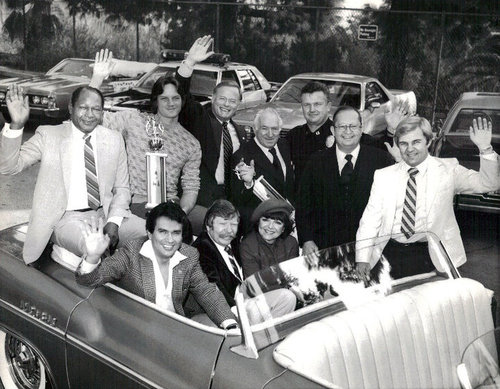full biography
Thomas “Tom” Bradley (December 29, 1917 – September 29, 1998) was the five-term mayor of Los Angeles, California, serving in office from 1973 to 1993. The son of sharecroppers and grandson of slaves, he made history when he was elected mayor of Los Angeles and became the first African American mayor of a major American city with an overwhelmingly white population.
Born in rural Calvert Texas, Bradley’s family moved to Los Angeles when he was 7 years old. For more than a million African Americans who migrated West in the early 20th century, Los Angeles was considered the “Promised Land,” providing the hope of a better life – far from the lynchings, urban riots and Jim Crow laws of the South. Bradley grew up on Central Avenue in Los Angeles, the heart of the black community. It was a relatively small, close knit community, where neighbor helped neighbor, offering stability, optimism, and a sense of belonging. It was in this Los Angeles that Bradley could dream the impossible dream – a life of hope and an enduring belief that change is possible.
Raised by a single mother, Tom Bradley challenged every obstacle placed in his way. He was an ambitious student, attended UCLA, where he became a record-breaking track star and team captain. He was also a classmate of Jackie Robinson. At UCLA, Bradley joined the prestigious black fraternity Kappa Alpha Psi, which helped him learn how to negotiate the complexity of a predominantly white institution. It was through this important social network, that he made friends and created relationships, which became the foundation for his life. He was elected president of the University Negro Club, which represented UCLA’s black students when racial issues flared on campus.
Tom Bradley served as a Los Angeles police officer for 21 years, reaching the rank of Lieutenant – the highest position an African American could achieve at that time. When covert racism prevented him from advancing his career, Bradley attended Southwestern Law School at night, passed the bar the first time, and became an attorney. With his law degree in hand, he resigned from the LAPD.
While a police officer, Bradley became actively involved in politics, notably in the Democratic Minority Conference and the California Democratic Council, a progressive liberal reform group with a racially mixed membership. In 1963, he was elected to the Los Angeles City Council in the racially mixed 10th District, supported by a multi-ethnic coalition led by African American civic and church leaders. He modeled his campaign after the campaign created by mentor and friend Mexican American L.A. City Councilman Edward Roybal in 1949. Bradley was one of three African American men elected to the Council in 1963. Nowhere else in America were blacks incorporated into the political structure to the degrees they were in Los Angeles. The victories demonstrated how an organized and united black community could overcome hostility and indifference to win political representation. Los Angeles was a place where an innovative and powerful type of political coalition was being tested.
In the 1960s, America was polarized by race and mired in increasing social and political turmoil. A conservative reaction led to the election of Sam Yorty as mayor of Los Angeles in 1961. Four years later in 1965, the Watts rebellion in South Central Los Angeles ignited a wave of large-scale unrests throughout the nation and signaled an alarm that change was needed. In 1968, Dr. Rev. Martin Luther King, Jr. and presidential candidate Robert Kennedy were assassinated within months of each other; anti-Vietnam war and black power demonstrations escalated; and more than 20,000 students in five East L.A. schools walked out, protesting racial inequality and injustice. It was in this atmosphere that two-term City Councilman Tom Bradley decided to challenge Sam Yorty in 1969 for mayor of Los Angeles. It was a long shot.
African Americans were less than 18% of the population in Los Angeles in 1969, and Bradley knew if he had a chance of winning, he needed to reach across racial and ethnic lines and create a strong coalition of African Americans, Jews, liberal whites, Mexican Americans, and Asian Americans. Bradley won the primary in a crowded field of 13, and then faced off against Sam Yorty. The runoff turned ugly as Yorty ran an aggressive campaign infamous for its racism, exploiting fears and uncertainty. Yorty accused Bradley as being “anti-police” and asserted a majority of the police force would resign if Bradley were elected. He also implicated Bradley of running a campaign powered by “black militants, white radicals and Communists.” Bradley played down race as an issue as Yorty fueled the flames, but to no avail. Bradley’s message of hope and change was smothered in the ashes, and he lost the election. Despite the loss, Bradley came to symbolize the entire thrust of the African American movement for political representation in Los Angeles, while at the same time, the election was considered a major step on the road to biracial coalition power in Los Angeles.
Tom Bradley would have another chance to defeat Sam Yorty four years later. In 1973, the paranoia in America was no longer at a fever pitch as violent uprisings and protests subsided. Yorty's same old tired themes of race, for once, did not work. Voters put aside their fears and handed Tom Bradley a solid victory. Tom Bradley made history as the first African American mayor of a major U.S. city with an overwhelmingly white majority. He was successful because he continued to build upon his multi-racial coalition – the most durable and significant in American modern history, and unsurpassed until the election of President Barack Obama thirty-five years later. Bradley’s victory set off a euphoria among blacks and liberals in Los Angeles and attracted national and international attention. It also came at a time when people gave up hope for coalitions between black voters and white voters, and when he won, it opened up a new future for race relations nationwide.
Mayor Tom Bradley made a difference. He opened City Hall and city commissions to women, minorities and people with disabilities, largely for the first time. He transformed Los Angeles from a conservative, white, urban center into one of the most diversified and important cities in the world with a new skyline, vibrant downtown and revitalized financial and business districts. He positioned the growing metropolis to take its place as an international trade center. He influenced two generations of policy makers and leaders. He brought the city a glowing spot on the world stage with the 1984 Summer Olympics – the first-ever profitable Games.
He enacted environmental reforms, powerful anti-apartheid business practices, and ordinances prohibiting discrimination against gays and lesbians and people with AIDS. He prevailed in his long struggle to reform and bring civilian control to the LAPD. He twice ran for governor of California, losing by less than 1% the first time. If he had won, he would have been the nation’s first popularly elected African American governor. He held office of mayor for an unprecedented five terms.
But Tom Bradley’s political life was not without scandal, drama and controversy. His carefully constructed coalition frayed at the edges as the issue of forced busing erupted into a municipal war for Bradley, and a controversial speech by Louis Farrakhan, Minister of the Nation of Islam, strained relations between the black and Jewish communities. Black and Latino relations also fissured as the city was unable to neither prevent economic decline nor constrain police brutality.
In 1992, Los Angeles exploded into three days of civil unrest and shattered the illusion that a black mayor could end inequality and hopelessness. Bradley did not seek a sixth term and announced his retirement in 1993. Three years later, he suffered a stroke, which left him partially paralyzed and unable to speak for the rest of his life. In 1998, he died of a heart attack. Tom Bradley was 80 years old.
Tom Bradley’s story is a classic American success story; the grandson of slaves and son of sharecroppers who fought prejudice and bigotry to transform a major U.S. city, and in the process, transcended the barriers of race to realize the American dream. Yet, this film is far more important than a man and his dreams. This documentary resonates with the story of coalitions, which changed a city and set the stage for a realignment of politics and values, which on a national scale, led to the election of Barack Obama. It is the story of the challenges of diversity facing cities and nations, and the decisions that we all must make.




